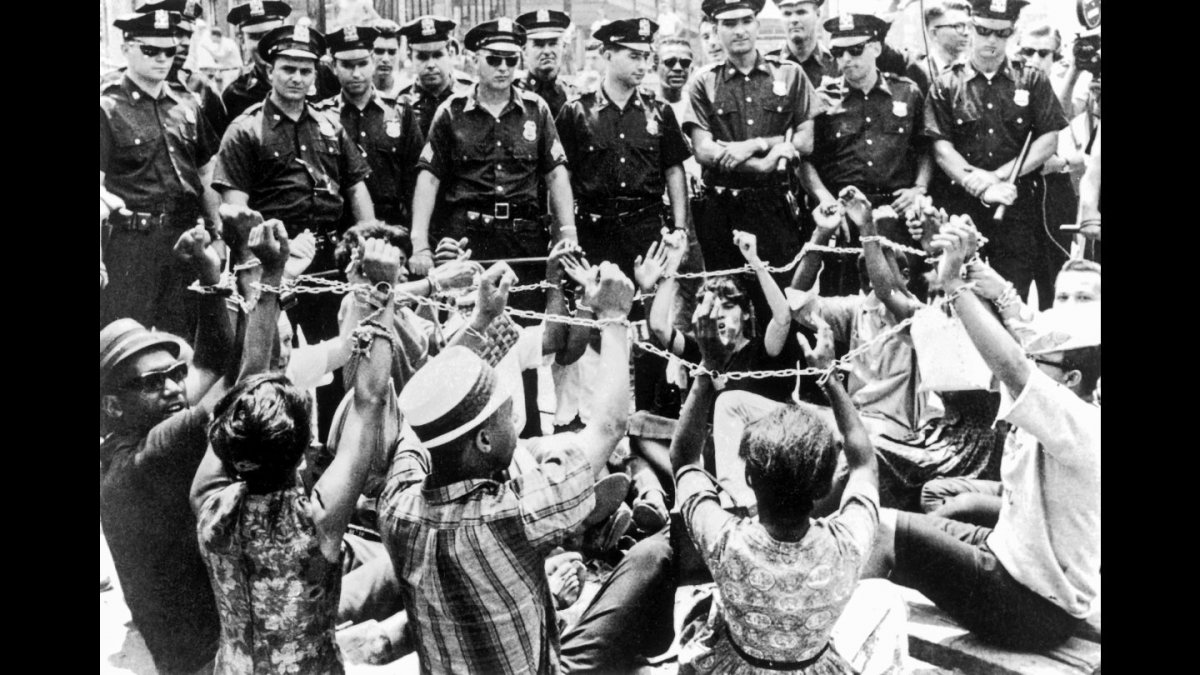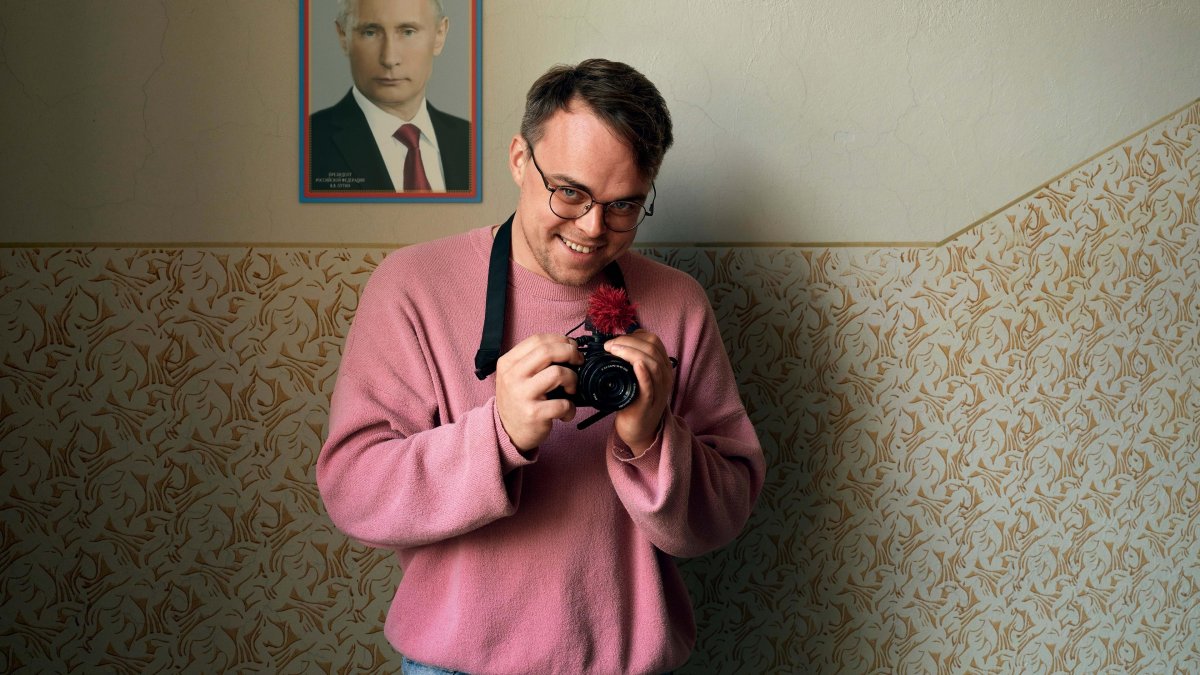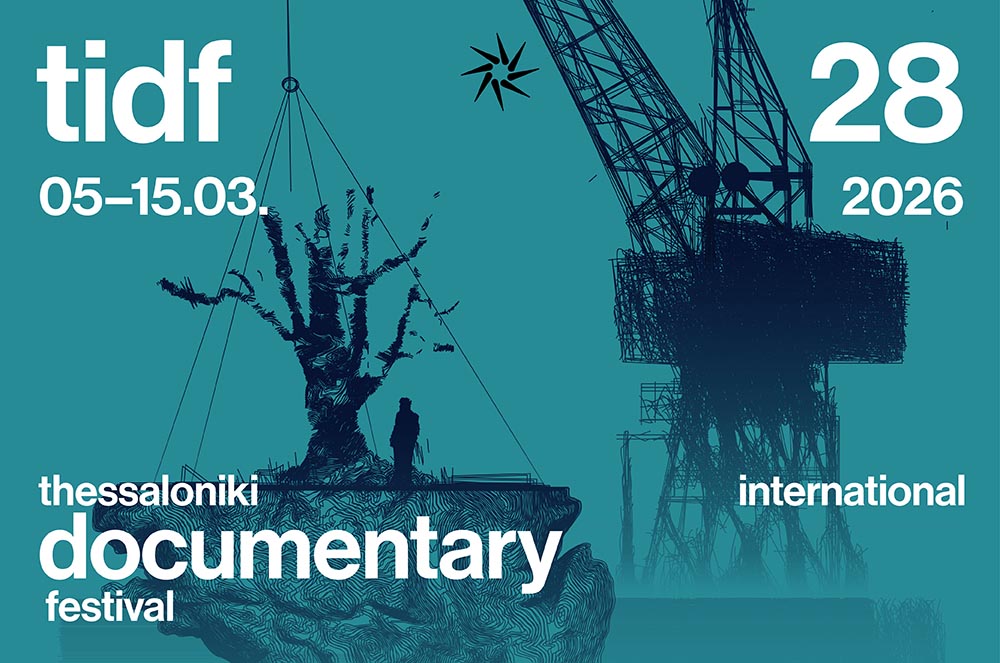Thessaloniki International Film Festival awarded an honorary Golden Alexander for his overall contribution to the art of cinema to the beloved creator Yorgos Tsemberopoulos, in a heart warming event that took place on Thursday, November 6th at the Olympion theatre, before the screening of the film The Enemy Within. The Golden Alexander was awarded by Dennis Iliadis, director and screenwriter, Katerina Bei, screenwriter and vice-president of the Festival's Board of Directors, and Giannis Tsiros, screenwriter.
The 66th edition hosted a large-scale tribute to his work where all of his feature films were screened. Additionally, the audience had the chance to watch for the first time on the big screen four rare, previously unseen short films by the renowned director, shot in the United States in the late 1970s during his student years at the American Film Institute in Los Angeles. At the same time, the film Black + White by Thanassis Rentzis and Nikos Zervos, with Yorgos Tsemberopoulos in the leading role, was also screened.
Orestis Andreadakis, the Artistic Director of the Festival, was the first to take the floor: “Today we honor one of the most important creators of modern Greek cinema, Yorgos Tsemberopoulos. We present all six of his feature films and, for the first time, the four shorts he made while studying in America. In addition, we screened the only film he starred in, Black + White by Thanassis Rentzis and Nikos Zervos.” Then, addressing Yorgos Tsemberopoulos, he said: “Dear Yorgos, the cinema you have served for fifty years is profoundly humanist. In each of your films we can see a mosaic of characters unfold, but at the same time we watch the changing landscape of Greece. As Konstantinos Tsoukalas wrote, “his stories write their own little history, while History itself winks at them ironically”, Orestis Andreadakis said.
He then added: "Your stories are not just films, but deep and clear cuts of humour, anger and sensitivity. Each of your shots carries truth, memory and responsibility. Someone may discover the true spirit of our times hidden inside them. He might even glimpse something more lasting: our continual battle to remain human amidst the noise you so dislike. This year we are screening all of your films at the Festival. We are revisiting not only the journey of a creator, but the trajectory of a person who dared to face society head-on. Thank you, Yorgos, for your images, your heroes, but also for the silence between the words and the shots: where the soul of cinema resides".
Then, three collaborators of Yorgos Tsemberopoulos took the stage. Dennis Iliadis, director and screenwriter, Katerina Bei and Giannis Tsiros, both writers and screenwriters. Dennis Iliadis was the first to speak: “Yorgos and I wrote The Back Door together 25 years ago. It was a wonderful collaboration. Every time I watch any of his films, I tell him, humorously, that he is the last humanist Greek director. And I want to emphasize how important and necessary he is for Greek cinema. Yorgos is not interested in excessive tricks in directing, and he never wanted to look smarter than his heroes. He truly loves them, stands next to them and looks deep into their eyes. That is why his films do more than merely record; they convey a deeply authentic human emotion. So, we, the younger directors, must watch a film by Yorgos twice a year to recentre ourselves. The sophisticated tricks and stylized shots are fine, but if a film has no heart, then it is rarely a good film. Yorgos, thank you very much for everything,” Dennis Iliadis stated.
Giannis Tsiros then took the floor: "I will make a confession: I feel guilty to have written the script for the film The Enemy Within, because I essentially led Yorgos Tsemberopoulos to commit his first cinematic murder. This was not easy. Yorgos tried to rationalize the concept of murder for a long time, until he came to the conclusion that murder as an act, whichever its motives may be, is essentially heinous and irrational. However, we did not stop feeling guilty. We also violated an ethical principle, namely that we should not profit from someone else’s loss. In fact, we came out on top, because with this film we won many international awards."
Afterwards, Katerina Bei took the floor: "Yorgos and I have known each other for many years; we hung out but had never collaborated. Dionyssis Samiotis arranged our meeting when he decided to make Stelios. Through this process, I felt happy for three reasons. Firstly, because of the fact that I would be collaborating with Yorgos Tsemberopoulos. Writing this script was a process that involved a lot of talking and many twists and turns, a process prolonged due to the verbosity of both of us. The second reason was the meteoric success of our film, watched by almost a million viewers in Greece and many Greeks abroad. We are grateful for its success which we never took for granted. The presentation of the personality of Stelios Kazantzidis hid great difficulties, but in the end I believe that we achieved our goal. The third and final reason lies in the narrative present and in the awarding of Yorgos Tsemberopoulos", Katerina Bey concluded.
This was followed by a short video with scenes from films by Yorgos Tsemberopoulos, curated by Nikos Pastras.
At this point, Dennis Iliadis awarded the honorary Golden Alexander to Yorgos Tsemberopoulos, stating: “I offer to you what you truly deserve”, while afterwards he gave the floor to the guest of honor. “I did not know what my colleagues would say before me”, Yorgos Tsemberopoulos initially stated. “Everything I had prepared to say has already been said. In this very theatre, but also in the large auditoriums of the Society for Macedonian Studies theatre, I have traveled all over the world through the magic of cinema for the last 50 years. In Thessaloniki I have spent some of the most important and beautiful moments of my life and I truly thank this city. I am very happy to have served it, as well as the Festival itself through my participation in the Board of Directors. It would be wrong not to share what I always carry inside of me, namely that my first cinematic lovers were Sakis Maniatis and Giorgos Panousopoulos. They didn't need much: they could do miracles only by holding the camera and using a small zoom lens. I wouldn't be here if it weren't for the people who wrote about me, the screenwriters of my films: Dennis Iliadis, Katerina Bei, Giannis Tsiros and Vassilis Alexakis," he noted.
Speaking about his filmography, he said: "It is a cinema that always seeks to draw inspiration from society, it seeks to live within society and therefore it needs the movie theatre and communication. For this reason, I can consider the Golden Alexander as a solid lifetime achievement audience award. Thank you very much!" Yorgos Tsemberopoulos pointed out.
After the screening of the film The Enemy Within, a Q&A followed. When asked how many supporting actors the film required, producer Eleni Kossyfidou said: "I don't remember the exact number, without forgetting of course the people who worked in the making of the film. There were many supporting actors who were used for the needs of Yorgos' film."
When asked what the biggest challenges were during the filming, Yorgos Tsemberopoulos mentioned: "As Giannis Tsiros said, I struggled with the fact that I would be making a murder film. I was very worried. I accepted it script-wise and understood what kind of film I would be making. Τhe fight scenes were difficult for me during the shooting. I had never done it before. I wanted realism, but I was afraid that Manolis Mavromatakis would get injured. That was my greatest worry."
Taking the floor, actor Manolis Mavromatakis, protagonist of the film The Enemy Within, noted: "I was very worried about getting injured. In such a case, the filming would have to be delayed. Also, I had never played such a big role and it was stressful for me that I had to do two months worth of filming. I learned afterwards that the assistant director, Dimitris Pantelias, had recommended me to Yorgos. I thank them both, as well as the Festival that awarded Yorgos because we, too, grow alongside him".
Then, the actor Giorgos Gallos said: "The big challenge for me was that I have no similarities with the character in the film. My job is not to undermine the roles, but to find the necessary elements to embrace them. Fortunately, through many rehearsals, we reached our goal".
When asked if he justifies the actions of his characters, Yorgos Tsemberopoulos replied: "The point is to justify them inside you. I made this film as a father. It would have been a completely different film if I hadn't been a father. My favourite scene is when the hero, his back on the wall, watches his loved ones sleeping. Everyone sees it from their own perspective. There is no definitive answer to existential questions. Whenever I watch the film, I am moved by the music. Unfortunately, our composer, Akis Daoutis, suddenly passed away. It is a great loss for Greek cinema. He had even written a song for the movie credits, sung by Foivos Delivorias. In the end, it didn't make it into the film because the lyrics spoiled the ending".
Referring to the casting process in his films, the director explained that "with hard work and rehearsals, you discover and draw things out of the actor. Most of them come from a theatre background and do their preliminary work. Laurence Olivier had said that a Shakespearean monologue is easy compared to the difficulty of the act of going to a newsstand, getting a newspaper and, without saying a word, letting the viewer understand that you and the newsboy are friends. These are small things, in other words, which must be resolved before filming begins." At that point, Giorgos Gallos added: "We talked a lot during filming and mainly about what is not said. About what happens in the silences and pauses."
When asked why The Enemy Within is his favourite film, the director replied: "I think it's the most underestimated film at the box office, as it was screened during the period of the big economic crisis. I would like the audience to watch it. However, I love all my films. Especially after this tribute, I love them a bit more."














